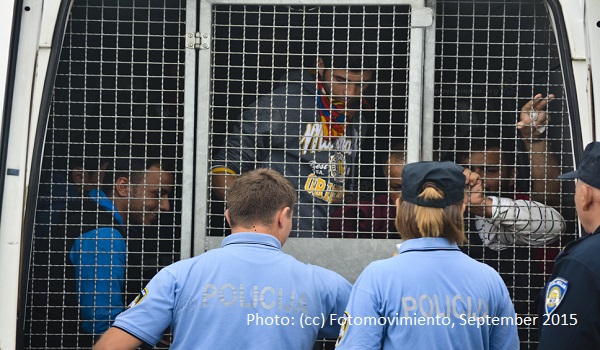Croatia has blocked MEPs from visiting its border with Bosnia and Herzegovina (BiH) and claims the intention of the visit was to damage the country’s reputation. Several thousand people continue to fend for themselves in neighbouring BiH, including families with small children who are not exempted from abuse and pushbacks by Croatian police. Following Hungary’s breach of an EU court ruling through continued pushbacks, the European Border and Coast Guard Agency (Frontex) has announced the suspension of its operations in the country.
On 29 January, Croatian border police have denied a delegation of four Italian MEPs, all S&D group members, access to a check point near Bosanska Bojna at the border with BiH. The visit took place in the context of continued pushbacks by Croatian authorities and the general conditions people on the move face in this region. The four politicians and accompanying journalists tried to bypass the blockade without success. “The police probably have something to hide: if we have been treated like this, imagine how migrants and potential asylum seekers could be treated,” one of the MEPs stated following the incident. The delegation managed to visit Lipa camp in BiH where they were informed by residents and aid workers about the inhumane living conditions and violent pushbacks by Croatian officials.
According to Croatia’s Interior Minister, Davor Bozinovic, the border visit had “the obvious intention to damage Croatia’s reputation,” adding “this is another in a series of provocations related to the actions of the Croatian police in fulfilling their tasks, and that is the protection of the state border”. Despite a mounting body of well-documented research, Croatia dismisses allegations of abuse, violence and pushbacks by its border police. Further, authorities denounce NGOs and media reporting as invalid, and imply migrants’ injuries – reportedly suffered at the hands of Croatian police – are self-inflicted. During a visit to BiH on 2 February, Croatia’s foreign minister Grlić Radman suggested that accommodation facilities for migrants in the neighbouring country should be established “at the entry points at the border”, meaning BiH’s eastern border with Serbia. Pointing to the current situation, where the majority of people stuck in BiH stays in the northwest of the country close to the Croatian border, Radman further highlighted “Croatia shares a 1,000 km-long border with BiH and thus the security of the Republic of Croatia can likely be jeopardized”.
In BiH, the humanitarian crisis remains unsolved. “Out of a total of about 8,000 migrants in Bosnia, about 2,000 people are basically left to fend for themselves in abandoned buildings, squats, makeshift settlements and in forests,” says Nicola Bay, Bosnia director at the Danish Refugee Council – an ECRE member. The International Organization for Migration (IOM) estimates that between 3,000 and 5,300 people are currently living in precarious conditions, including those in the sub-standard, snow-covered military tents that replaced the burned-down Lipa camp. The number of families living in north-eastern BiH has increased considerably in recent months, and thus the number of children. The Guardian has followed several families who have tried repeatedly to cross the Croatian border from Bosanska Bojna in BiH – the area Italian MEPs were denied to access last week. The media outlet documented their journeys in pictures and reported on the abuse they experienced during their failed attempts. An Afghan family travelling with seven children has told the Guardian that they have been pushed back into Bosnia eleven times by the Croatian police, who stripped the youngest daughter bare to check if the parents had hidden mobile phones or money in her nappy. According to the Border Violence Monitoring Network (BVMN), such incidents are common and “women and young girls have reported being searched everywhere by male Croatian police officers”. Those who suffered abuse at EU’s borders, including children, will carry the psychological trauma for years, highlights MSF humanitarian officer Maham Hashmi, stating that “they will always have in mind that Europe brutalised them instead of protecting them and their right to seek asylum.” Last year, more than 800 children were pushed back by the Croatian authorities.
On 27 January, Frontex announced the suspension of its operations in Hungary following the country’s violation of an EU court ruling by continuing to push back people into Serbia. According to ECRE member the Hungarian Helsinki Committee (HHC) more than 4,400 pushbacks were carried out since the ruling in December. Media reports that Hungary has sent 30 police officers to North Macedonia and Serbia to support local border patrols in controlling the border between those two countries.
For further information:
- ECRE, Balkan Route: Dire Situation in BiH as Winter Sets in, Calls for Response Continue, Violent Pushbacks Across the Region, January 2021
- ECRE, Balkan Route: Life-threatening Conditions for People trapped in Bosnia as Temperatures Fall, January 2021
- ECRE, Bosnia and Herzegovina: Thousands Remain Stuck in Freezing Temperatures on EU’s Doorstep over Political Dissent, January 2021
Photo: (CC) Fotomovimiento, September 2015
This article appeared in the ECRE Weekly Bulletin. You can subscribe to the Weekly Bulletin here.

